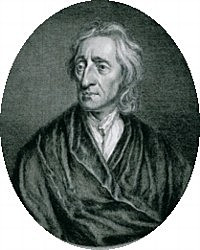John Locke, a towering figure of the Enlightenment, profoundly influenced Western philosophy and political thought. His ideas on government, natural rights, and religious toleration shaped modern liberalism and continue to resonate today. Understanding the context of his life is crucial to grasping the depth and relevance of his work. This chronology outlines the key John Locke Dates Of Life, providing a detailed timeline of the events that shaped his intellectual journey and lasting legacy.
Early Life and Education (1632-1666)
1632: Born in Wrington, Somerset, on August 29th. This marks the beginning of John Locke dates of life, in a period of significant social and political change in England.
1642: The outbreak of the English Civil War. This tumultuous period of English history, witnessing conflict between the monarchy and Parliament, would have undoubtedly influenced Locke’s early perspectives on governance.
1647: Admitted to Westminster School in London. Receiving education at a prestigious institution like Westminster set the stage for Locke’s intellectual development.
1652: Elected a Student of Christ Church, Oxford. Oxford University became the center of Locke’s academic life for many years, where he was immersed in classical learning and emerging scientific thought.
1655: Graduates as a Bachelor of Arts from Oxford. This formal degree marked an early milestone in Locke’s academic career.
1658: Earns a Master of Arts degree; Oliver Cromwell, the Lord Protector, dies. Locke’s continued academic success coincided with significant political shifts in England, including the death of Cromwell, which paved the way for the Restoration.
1660: The Restoration of the monarchy under Charles II. This pivotal event, bringing the Stuarts back to power, reshaped the political landscape and influenced Locke’s evolving political philosophy.
1660–62: Writes Two Tracts on Government, critiquing toleration (published later). These early writings reveal Locke’s initial, less tolerant stance, which later evolved into his strong advocacy for religious freedom.
1665–66: Serves as embassy secretary to the Elector of Brandenburg at Cleves (Kleve). This diplomatic experience broadened Locke’s horizons and exposed him to different political systems and cultures on the European continent.
1666: Licensed to practice medicine and granted dispensation to retain his Studentship at Oxford without taking holy orders. Locke’s foray into medicine and his strategic decision to avoid ordination highlight his diverse interests and pragmatic approach to his career. The Great Fire of London also occurred this year, a significant event in English history.
Career and Political Engagement (1667-1688)
1667: Joins Lord Ashley’s household (later the Earl of Shaftesbury); becomes resident in London. This marked a turning point in Locke’s career, moving him into the heart of English politics and intellectual circles.
1667: Writes Essay Concerning Toleration (published posthumously). This early essay already demonstrates Locke’s developing ideas on religious tolerance, a theme that would become central to his philosophy.
1668: Oversees a life-saving operation on Ashley and elected a Fellow of the Royal Society. Locke’s medical skills and his association with the Royal Society underscore his engagement with both practical and scientific pursuits.
1669: Helps draft The Fundamental Constitutions of Carolina. This involvement in colonial governance reveals Locke’s practical application of his political theories to real-world scenarios.
1671: Becomes Secretary to the Lords Proprietors of Carolina and begins drafting An Essay Concerning Human Understanding. These roles highlight Locke’s dual focus on practical administration and profound philosophical inquiry.
1672: Ashley becomes Earl of Shaftesbury and Lord Chancellor; Locke appointed secretary for ecclesiastical presentations. Locke’s close association with Shaftesbury placed him at the center of power and political intrigue.
1675: Graduates as a Bachelor of Medicine and travels to France, residing mainly in Montpellier and Paris. Locke’s continued pursuit of medical knowledge and his time in France exposed him to continental European intellectual currents.
1679: Returns to England amidst the Popish Plot revelations and the Exclusion Crisis. Locke’s return coincided with a period of intense political turmoil in England, further shaping his views on government and liberty.
1679–81: Exclusion Crisis; Locke writes Two Treatises of Government during this period of political and social upheaval. This seminal work, although written earlier, became highly relevant during the Exclusion Crisis, arguing against absolute monarchy and for the right to revolution.
1683: Shaftesbury dies in Holland; Locke attends his funeral. The death of his patron and close associate, Shaftesbury, was a personal and political blow to Locke. He then goes into exile in Holland.
1683–89: Exile in Holland. This period of exile was crucial for Locke’s intellectual output, providing him with a safe haven to write and publish his most influential works.
1685: Louis XIV revokes the Edict of Nantes, intensifying persecution of Huguenots; Locke writes Epistola de Tolerantia (Letter Concerning Toleration). The persecution of Protestants in France directly influenced Locke’s writing of A Letter Concerning Toleration, a powerful argument for religious freedom.
1688: The Glorious Revolution in England. This pivotal event, replacing James II with William and Mary, aligned with Locke’s political ideals and paved the way for his return to England and the publication of his major works.
Later Life and Legacy (1689-1704)
1689: Returns to England after the Glorious Revolution; publishes A Letter Concerning Toleration, Two Treatises of Government, and An Essay Concerning Human Understanding. This year marks the culmination of Locke’s intellectual endeavors with the publication of his most important works, profoundly impacting Western thought.
1690: Battle of the Boyne and publication of A Second Letter Concerning Toleration. Locke continued to defend his ideas on toleration amidst ongoing debates and conflicts.
1691: Settles at Oates in Essex in Damaris Masham’s household. Oates became Locke’s final home, providing a supportive intellectual environment in his later years.
1693: Publication of Some Thoughts Concerning Education. Locke expanded his philosophical contributions to include practical advice on education, reflecting his comprehensive approach to human understanding and societal improvement.
1696: Appointed a member of the Board of Trade and Plantations. Locke’s appointment to this board demonstrates his continued involvement in public affairs and his expertise being sought by the government.
1704: Dies at Oates on October 28th and is buried in High Laver churchyard, Essex. The John Locke dates of life conclude with his death, but his ideas continued to spread and influence generations to come.
This detailed John Locke dates of life chronology reveals not just a timeline, but the rich tapestry of historical, political, and intellectual events that shaped one of history’s most influential thinkers. His life, deeply embedded in the major shifts of 17th-century England and Europe, provides essential context for understanding his enduring philosophical contributions.
 John Locke portrait engraving. Learn about John Locke dates of life and key events in his biography timeline.
John Locke portrait engraving. Learn about John Locke dates of life and key events in his biography timeline.
Source: John Locke, A Letter concerning Toleration and Other Writings, edited and with an Introduction by Mark Goldie (Indianapolis: Liberty Fund, 2010). Chapter: Chronology of Locke’s Life.

